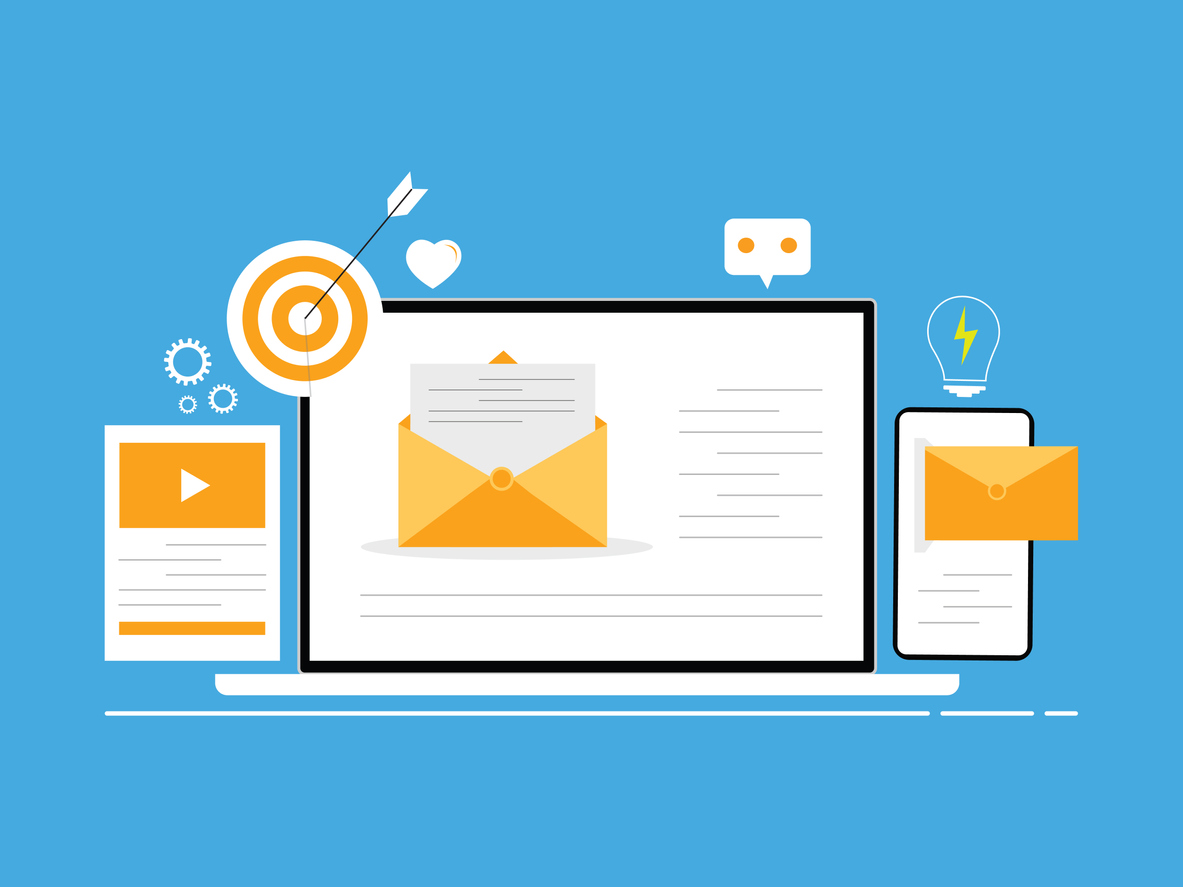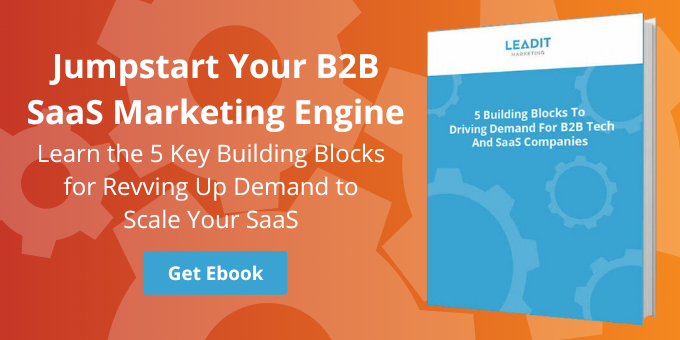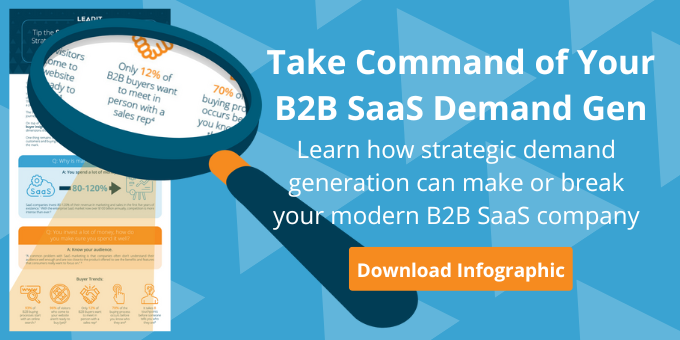Best B2B Email Marketing Platforms
While inbound content marketing continues to dominate the field for digital-based companies today, one essential outbound strategy that should remain in every marketer’s toolkit is email marketing. Its continuing ROI value is reflected in the proliferation of email marketing platforms in recent years, with growing features and functionalities not seen in earlier versions.
If you’re ready to try a new email platform but aren’t sure which product best suits your business model, here’s a guide to help you evaluate the best email marketing software for your B2B tech organization.
One Size Does Not Fit All: How to Select an Email Marketing Platform for Your B2B Tech Organization
Email marketing software will likely be the primary means by which you deliver engaging content, special offers, personalized messages, and more to your expanding list of customers.
There are dozens of platforms on the market today, offered by everyone from scrappy startups to industry giants like Salesforce and Hubspot. The best email marketing platforms for B2B companies come in packages to fit every business size and imaginable need.
We’ve done the research on dozens of platforms (and in some cases drawn from personal experience), and then narrowed down a list for you according to what type of marketing operation you’re running, and the size of your business. Here are what we consider to be the best email platforms for different sized B2B companies, from startup to enterprise level.
When you’ve selected the email marketing platform that suits your B2B tech organization, check out our blog, 5 Characteristics of the Perfect Email Newsletter.
Best Email Marketing Software for New and Smaller B2B Tech Organizations
If your B2B company is just getting started, your marketing budget is probably starting small, and your mailing list maybe even smaller. Most email marketing platforms are priced according to the size of your list, with full scalability and adding on more features as your list expands into higher-priced categories of service.
If you’re small, it’s best to stick with the smaller software makers who understand you.
Many small business owners wear several hats and don’t want to learn a ton about marketing automation just to blast out their emails. Some who don’t want to deal with it at all will outsource the work with marketing agencies, while others keep it in-house.
In either case, you will want to keep your platform as simple as possible for any first-time user to log in and get to work. Today, though, simply doesn’t have to mean underpowered. The smaller software makers understand that you need a robust yet user-friendly system that includes
- An easily intuitive user interface
- A simple permissions system with a single opt-in allowed (meaning when you import a list you don’t have to write them first and request permission to keep them on your list before you send out any marketing emails)
- A robust media library with drag-and-drop uploads, fluid text wrapping, and scalability
- List filters that allow you to segment and sequence your email campaigns
- A feature for triggered emails (sent when someone visits your page, clicks on something, or completes a contact form)
- A full Analytics dashboard that visualizes the results of your campaigns in graphs and comparative tables.
Read on to learn more about the following email marketing platforms:
Emma
If you have a small(ish) team, Emma should be one of your first contenders for email marketing software, with top-rate customer support people who actively engage with making your business successful. The software is easy to use and super intuitive, even for companies as small as 1-2 people who haven’t used email marketing software before.
However, if you expect to grow fast you may outgrow the software within a few years. Its expanded automation features can be clunky to use and don’t offer the full functionality of the bigger automation suites like those from Salesforce and Hubspot.
AWeber
Despite looking a bit outdated, Aweber sits in a sweet spot of being cost-effective and easy to use. It has all the important features you’d want, without being too feature-heavy. For those starting out, it has great reporting to help you learn what does and doesn’t work, and it walks you through how to set up your signup forms and newsletters.
AWeber lets you use a free trial version of your mailing list that has 500 or fewer names. If you’re a bit more advanced in your email marketing, Aweber has some good features, such as split testing. Split testing enables you to send different variations of a campaign to different segments of your list, allowing you to compare and improve your open and engagement rates.
Act-On
Act-On is ideal for freelancers as well as small to larger-sized businesses. It’s a full-featured solution with easy-to-create email templates. Though it can be difficult to navigate and sort through contact lists, Act-On offers a feature-rich platform that includes bulk social media posting, sales reports, real-time sales alerts, a mobile app feature, and Social CRM. Users especially appreciate Act-On’s top-tier customer support, especially since there can be a bit of a learning curve with this software.
MailChimp
MailChimp is one of the original and best-known platforms, along with Constant Contact, for small business marketers. It still has the most generous free trial offer of all its competitors, which unlike most of the others is defined by the size of your mailing list (2,000 for MailChimp, vs AWeber’s 500) rather than by a calendar trial period of 14 to 60 days.
MailChimp has also recently added many features such as improved graphics and the ability to build landing pages. On the downside, unlike most, MailChimp requires double opt-in if you’re importing a customer list you’ve built up elsewhere. (Don’t even think of buying lists!) This means asking advance permission from previous contacts to send them marketing emails — and inevitably many will ignore or won’t opt-in again.
Best Email Marketing Software for Mid-Size B2B Companies
Fast-growing B2B companies who expect to scale up quickly are best served by email marketing software with additional features beyond the basics that satisfy a smaller company’s needs.
Learn more about the following email marketing platforms below:
GetResponse
GetResponse lets you build landing pages and enables webinar marketing, two essentials for the B2B marketer. GetResponse’s pricing is also very affordable (and, unlike other services, stays affordable as your list grows). Their platform is easy to use, and importing your lists takes seconds. They also feature more than 500 beautifully designed email templates, making it easy for beginners to create professional-looking newsletters and autoresponders.
Customer.io
Customer.io’s email product is built specifically for customers who make web and mobile apps. Web and mobile apps (and other tech businesses) constitute a minor 11% of Mailchimp’s overall target market, so Customer.io decided to capture this niche with some nifty tools just for app and software makers. They don’t just show you open, and clicks but also on-site conversions from the emails, to really help you measure campaign effectiveness. Conversions are a specific activity back on the site, like completing an upgrade, accepting an offer, or inviting a friend.
Campaign Monitor
Campaign Monitor’s drag-and-drop tools and powerful automation workflows make it easy to send relevant and personalized emails, and track responses. Users love the email builder’s professional look on both mobile and desktop screens. List management tools allow you to manage your subscribers with ease and build segments based on your own criteria.
Sharpspring
SharpSpring is ideal for the mid-size market and a special favorite of marketing agencies. Cost is one reason: pricing is a tenth the cost of comparable platforms. It’s also flexible, with month-to-month contracts instead of a long-term commitment. For agencies, there’s a special pricing model and they also offer a customizable platform, single sign-on, and easy client management.
However, there’s no SEO help for blogging, no progressive profiling, and no social publishing.
Best Email Marketing Software for B2B Enterprise Companies
Just like with smaller companies, it’s best to stick with the like-kind. A large organization with tens of thousands of names on a customer list in most cases requires a much bigger email platform from an enterprise-level software maker, with more integrated functionalities that are accessible to both sales and marketing teams.
Narrow down your shortlist with our top picks for email marketing software for B2B enterprise organizations.
Pardot
Salesforce obviously saw something in Pardot, and bought it for good reason. Salesforce, a leader in the CRM marketplace, integrates the email features of Pardot for data sharing purposes although some users complain that it’s not as seamless as it could be.
The bones of a great product are there, and there are some great, easy-to-use features for companies already using the Salesforce CRM products.
Bottom-line: Templates can be somewhat rigid to use, but if you’re more concerned with closing a sale than with a beautifully designed email, it could be a good choice.
Hubspot
Hubspot is one of our favorites and was an early pioneer of content marketing software in general. Its email marketing platform can be used separately or integrated with the full marketing automation platform that includes a wide selection of social media, content, and inbound marketing features on user-friendly dashboards that help you visualize all your data and marketing effectiveness in one place.
Keap
Like Pardot and Hubspot, Keap is not just an email marketing tool; it is a full sales and marketing automation tool with a lot of additional CRM features. Email marketing is just one of the many functions offered. Its automated workflows and sequencing options allow you to run highly segmented and nuanced integrated marketing campaigns.
However, the buy-in and ongoing monthly rate with Keap is steep, and it can be difficult for a first-time user to learn how to use this rather complicated system. Once you’re over the learning curve, though, users swear to its awesomeness.
Marketo
Marketo hits the sweet spot for small to mid-sized businesses. Pros include an easy and intuitive platform, quick and easy setup, and full integration with Salesforce. On the downside, users say it has a poor landing page and form builder, limited reports and analytics, and there tend to be steep jumps in pricing.
Eloqua
Eloqua, which is part of the Oracle Marketing Cloud, is recommended for large global enterprises, with customers like American Express and Sony. It includes all the features you’d expect from a full-featured marketing automation platform, like Social CRM, lead scoring and lead segmentation, web activity tracking and Salesforce integration. Basic pricing for Eloqua starts at $2000 a month.
Whatever software platform you choose, if you’d still rather not run your own email campaigns then Leadit Marketing can help you with that. Book a free 30-minute consultation with our email marketing experts to learn how we can help you create email marketing campaigns for your B2B tech organization- no matter how big or small.











